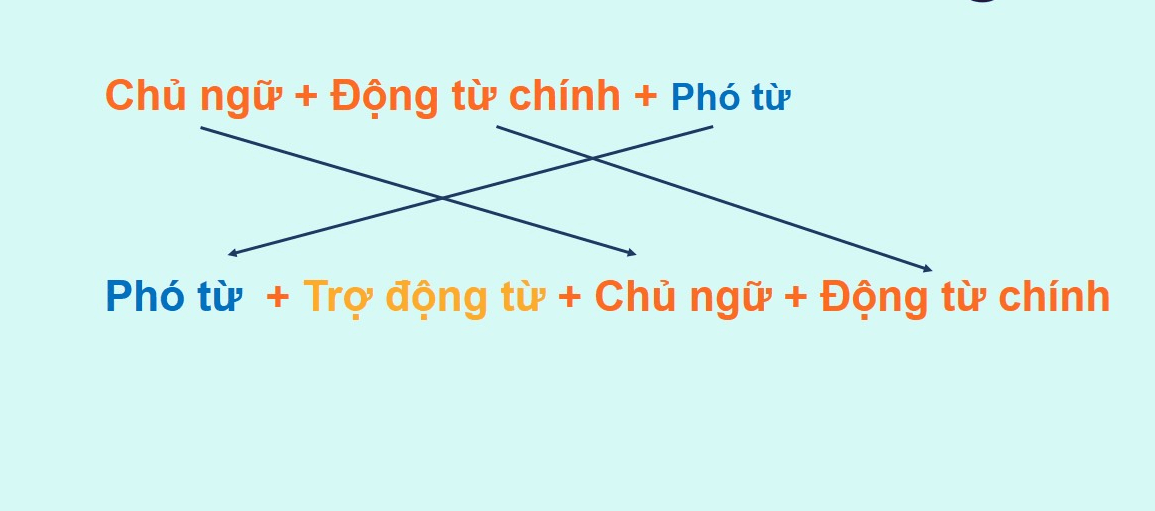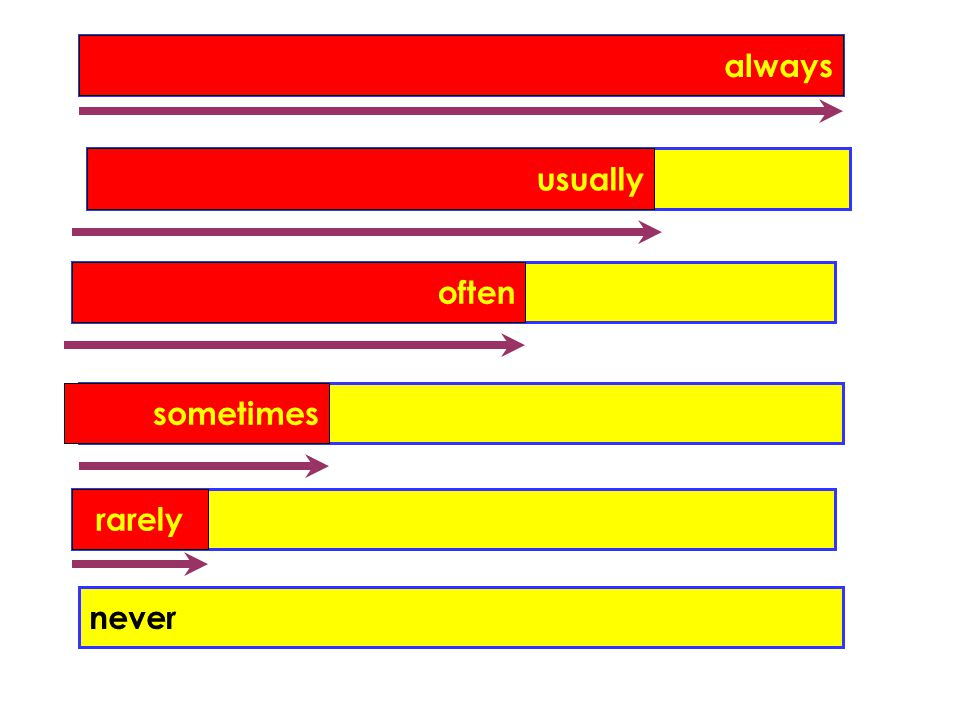Nếu bạn vẫn còn cảm thấy bối rối và thường xuyên bị mắc lỗi về vị trí, cấu trúc và cách dùng của phó từ trong câu thì hãy tham khảo bài viết hôm nay nhé.
Bài viết hôm nay sẽ chia sẻ đến bạn về cấu trúc, vị trí và cách sử dụng chính xác nhất của phó từ trong tiếng Anh, những lưu ý quan trọng, bên cạnh đó là kèm theo bài tập vận dụng cụ thể để bạn áp dụng ngay kiến thức đã học vào bài làm.
1. Vị trí của phó từ trong tiếng anh
Thông thường, phó từ thường có ba vị trí trong câu là: đứng đầu câu (trước chủ ngữ), đứng giữa (sau chủ ngữ và trước động từ vị ngữ, hoặc ngay sau động từ chính) hay đứng cuối câu (hoặc mệnh đề).

2. Các loại phó từ trong tiếng anh
2.1. Phó từ chỉ cách thức – adverbs of manner
Ví dụ: bravely, fast, happily, hard, quickly, well.
Vị trí của phó từ chỉ cách thức: Thường đứng sau động từ hoặc sau tân ngữ (nếu có).
Ví dụ: She danced beautifully.
They speak English well.
Khi câu có cấu trúc dạng: verb + preposition + object, thì phó từ trong tiếng anh chỉ cách thức có thể đứng trước giới từ hoặc sau tân ngữ.
Ví dụ: He looked at me suspiciously = he looked suspiciously at me.
Nếu tân ngữ quá dài, bạn có thể đặt phó từ trước động từ như sau:
Ví dụ: She carefully picked up all the bits of broken glass.
He angrily denied that he had stolen the documents.
They secretly decided to leave the town.
Từ “Somehow” có thể đặt ở vị trí đầu câu hay sau một động từ mà không có tân ngữ hoặc sau tân ngữ như câu dưới đây:
Ví dụ: Somehow they managed.
They managed somehow.
They raised the money somehow.

2.2. Phó từ trong tiếng anh chỉ thời gian – adverbs of time
Phó từ chỉ thời gian ví dụ như những từ: now, soon, still, then, today, yet, recently, afterwards…
Vị trí: Phó từ chỉ thời gian thường đặt ở đầu câu hoặc cuối mệnh đề.
Ví dụ: Eventually he came = he came eventually.
Then he went home = he went home then.
Các từ như “Before, early, immediately, late” thì đặt sau mệnh đề.
Ví dụ: He came late.
I’ll go immediately.
Nếu “before” và “immediately” được sử dụng như một liên từ thì nó được đặt ở đầu mệnh đề.
Ví dụ: Immediately the rain stops we’ll set out.
Từ “Yet” thường đặt sau động từ hoặc sau (động từ + tân ngữ).
Ví dụ: He hasn’t finished (his breakfast) yet.
Từ “Still” được đặt sau động từ “be” nhưng lại đứng trước các động từ khác.
Ví dụ: She is still in bed.
He still doesn’t understand.
2.3. Phó từ trong tiếng anh chỉ địa điểm (adverbs of place)
Một số phó từ chỉ địa điểm phổ biến : away, everywhere, here, nowhere, somewhere, there…
Vị trí của phó từ chỉ địa điểm: Nếu không có tân ngữ, những phó từ chỉ địa điểm thường đặt sau động từ.
Ví dụ: She went away.
Bill is upstairs.
Nếu có tân ngữ, thì phó từ chỉ địa điểm đặt sau tân ngữ.
Ví dụ: She sent him away.
I looked for it everywhere.
Cấu trúc “Here, there” + be/come/go + noun.
Ví dụ: Here’s Tom.
There’s Ann.
Here comes the train.
There goes our bus.
Từ “Here”, “there” đặt ở vị trí đầu câu có ý nghĩa nhấn mạnh hơn so với chúng đặt ở sau động từ.
Nếu noun là đại từ nhân xưng thì nó thường được đặt trước động từ.
Ví dụ: There he is.
Here I am.

2.4. Phó từ trong tiếng anh chỉ tần suất – adverbs of frequency
Một số phó từ chỉ tần suất: always, frequently, often, sometimes, occasionally, usually, continually, ever, never, rarely, seldom, hardly ever….
Vị trí của phó từ chỉ tần suất: Đứng sau động từ “tobe” (ở các thì đơn giản)
Ví dụ: He is always in time for meals.
Đứng trước động từ thường.
Ví dụ: They sometimes stay up all night.
Từ “Often” nếu đặt ở cuối thì thường đi cùng “very” hoặc “quite”
Ví dụ: He walked quite often.
Các từ như “Hardly, ever, never, rarely” có thể được đặt ở đầu câu nhưng bạn phải dùng đảo ngữ của động từ như dưới đây:
Ví dụ: Hardly/ scarcely ever did they manage to meet unobserved.
2.5. Phó từ trong tiếng Anh chỉ mức độ – adverbs of degree
Những phó từ chỉ mức độ thường gặp: fairly, hardly, rather, quite, too, very, absolutely, almost, really, extremely, only, rather, completely, just…
Vị trí của phó từ chỉ mức độ: Phó từ chỉ mức độ dùng để bổ nghĩa cho một tính từ hoặc một phó từ khác. Nó thường được đặt trước tính từ hoặc phó từ.
Ví dụ: You are absolutely right.
I’m almost ready.
Những phó từ trong tiếng anh chỉ mức độ sau đây có thể bổ nghĩa cho động từ như : almost, barely, enough, hardly, just, quite, rather, little, much, nearly, really…
Ví dụ: He almost/nearly fell.
I’m just going.
Từ “only” thường được đặt trước tính từ, động từ và phó từ, trước hoặc theo sau danh từ hay đại từ
Ví dụ: He had only six apples…
He only lent the car.
I believe only half of what he said.
Nhưng trong văn phong nói, người Anh thường đặt “only” trước động từ.
Ví dụ: He only had six apples.
I only believe half of what he said.

Với từ “Rather” bạn có thể sử dụng trước “alike, like, similar, different…” và trước tính từ so sánh hơn.
Ví dụ: Siamese cats are rather like dogs in some ways.
The weather was rather worse than I had expected.
Các từ “Hardly, scarcely, barely” mang nghĩa phủ định, “hardly” thường được sử dụng với “any, ever, at all” hoặc động từ “can”.
Ví dụ: I hardly ever go out.
It hardly rained at all last summer.
Her case is so heavy that she can hardly lift it.
Phó từ trong tiếng anh, “Hardly” cũng có thể sử dụng với các động từ khác.
Ví dụ: I hardly know him.
Scarcely có thể thay thế hardly trong một số trường hợp như trên.
2.6. Phó từ trong tiếng anh chỉ sự nghi vấn -interrogative
Một số ví dụ : when, where, why, how …
Vị trí: phó từ nghi vấn đứng ở đầu câu
Ví dụ: When did you see her?
Why was he late?
2.7. Phó từ quan hệ – relative
Một số phó từ quan hệ: when, where, why…
Vị trí của phó từ quan hệ là đứng sau danh từ.
Ví dụ: I remember the day when they arrived.
The hotel where we stayed wasn’t very clean.
The reason why I’m phoning you is to invite you to a party.
3. Lưu ý cách dùng phó từ trong tiếng Anh
Khi sử dụng phó từ, bạn cần phải nắm rõ một số quy tắc cụ thể như sau:

- Phó từ dùng để chỉ thời gian thường nằm ở vị trí cuối câu.
- Phó từ không bao giờ nằm ở vị trí giữa động từ và tân ngữ.
- Khi bạn so sánh hơn kém hay so sánh cấp, nếu sử dụng các phó từ kết thúc với đuôi “ly” thì bạn có thể so sánh như các loại tính từ với 2 âm tiết trở lên.
- Trong một câu văn mà có cả phó từ trong tiếng anh chỉ cách thức, địa điểm, thời gian, thì trật tự thường là phó từ cách thức + phó từ địa điểm + phó từ thời gian.
4. Bài tập vận dụng phó từ
Bài 1: Khoanh tròn vào đáp án đúng
Question 1. The judge told him it was __________ to drink and drive and banned him for a year.
A.responsible B. irresponsible C. responsibilty D. irresponsibility
Question 2. Most doctors are __________ after they learn general medicine.
A.special B. specialists C. especially D. specialist
Question 3. Peter’s gained so much weight because he can’t stop.
A.Eat B. edible C. eatable D. overeating
Question 4. The sun and the moon are often __________ in poetry.
A.person B. personal C. personalize D. personified
Question 5. The work is still at very __________ level.
A.experimental B. experiment C. experimental D. expire
Question 6. She wants to be an actress but her parents__________ of her intention.
A.approve of B. approval C. disapprove D. disapproval
Question 7. In the Middle Ages, salt was very valuable so that slaves were_________ with it.
A.compare B. comparable C. comparative D. incomparable
Question 8. The__________ of the trains and the buses causes frustration and annoyance.
A.frequent B. frequency C. infrequent D. infrequency
Question 9. It is usually forbidden to destroy __________ buildings.
A.history B. historic C. historical D. historically
Question 10. This matter is very __________. Don’t discuss it outside the office.
A.confident B. confidential C. confidence D. confide
Supply the correct word form.
Question 11. I didn’t know who she was with a mask on. She was completely__________.
A.recognize B. recognizable C. recognition D. unrecognizable
Question 12. I felt __________ to speak on the subject. In fact, I could have done it perfectly.
A.qualify B. qualified C. unqualified D. qualification
Question 13. They were totally__________ by the girl’s disappearance
A.mystery B. mysterious C. mysterified D. mystified
Question 14. They are an incredibly __________ family. You should see how much food they throw away.
A.wasted B. wasteful C. wastefully D. waste
Question 15. To be successful, an artist must show great __________
A.origin B. original C. originally D. originality
Supply the correct forms of the words.
Question 16. He __________ goes to the pub before lunch on Sunday.
A.variable B. various C. variety D. invariably
Question 17. The judge described John as a “__________ criminal” who was a danger to members of the public.
A.hard B. hard – working C. hardship D. hardened
Question 18. The flowers are a small __________ of your great kindness.
A.know B. knowledge C. knowledgeable D. acknowledgement
Question 19. The idea that the sun “rises” is a popular __________.
A. conceive B. concept C. conception D. misconception
Question 20. You look rather __________. Are you worried about something?
A. occupy B. occupied C. preoccupy D. preoccupied
Bài 2: Sắp xếp các từ thành câu hoàn chỉnh
- out a twice goes he week.
- usually early she up wakes.
- grandmother Spain visit my a twice we year in.
- restaurant my opposite often at I school eat the.
- always Pedro first in student class is the.
- home hardly ever they Saturday stay at a night on.
- the once cinema we week go a to.
- Wednesday Jane see every I other and each.
- walk sometimes I work to.
- car radio the in usually we to listen the.
Bài 3: Hoàn thành các câu bằng cách sử dụng một từ dưới đây.
Đôi khi bạn sẽ cần sử dụng tính từ như (carefull etc ) và trạng từ như (carefully etc. )
carefull(y) completel(y) continous(ly) financial(ly) fluentl(y)
happy/happily nervous(ly) perfect(ly) quick(ly) special(ly)
- Our holiday was too short. The time passed very quickly.
- Steve doesn’t take risks when he’s driving. He’s always …………………
- Sue works ………………… She never seems to stop.
- Rachel and Patrick are very ……………. Married.
- Maria’s English is very ……………. Although she makes quite a lot of mistakes.
- I cooked this meal for you …………….. So I hope you like it.
- Everythings were quite There … ………. Silence.
- I tried on the shoes and they fitted me ……………
- Do you usually feel …………………… before the examination?
- I’d like to buy a car, but it’s ………………. impossible for me at the moment.
Đáp án bài tập vận dụng
Đáp án bài tập vận dụng 1
| 1. B | 2. В | 3.D | 4. D | 5. A | 6.C | 7. D | 8. D | 9. В | 10. В |
| 11. D | 12. С | 13. D | 14. В | 15. D | 16. D | 17. D | 18. D | 19. D | 20. D |
Đáp án bài tập vận dụng 2
- He goes out twice a week.
- She usually wakes up early.
- We visit my grandmother in Spain twice a year.
- I often eat at the restaurant opposite my school.
- Pedro is always the first student in the class.
- They hardly ever stay at home on a Saturday night.
- We go to the cinema once a week.
- Jane and I see each other every Wednesday.
- I sometimes walk to work.
- We usually listen to the radio in the car.
Đáp án bài tập vận dụng 3
- quickly
- Careful
- Continuously
- Happily
- Fluent
- Specially
- Complete
- Perfectly
- Nervous
- Financially or completely
Trên đây là các phó từ trong tiếng Anh bao gồm kiến thức cụ thể về vị trí, cách sử dụng và bài tập đáp án chi tiết. Các bạn cũng nên tham khảo những kiến thức ngữ pháp quan trọng khác tại tienganhduhoc.vn nhé.
source https://tienganhduhoc.vn/cac-pho-tu-trong-tieng-anh-vi-tri-cau-truc-cach-su-dung/
Không có nhận xét nào:
Đăng nhận xét